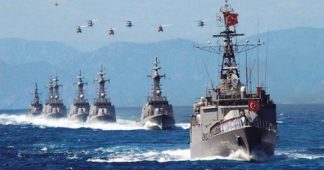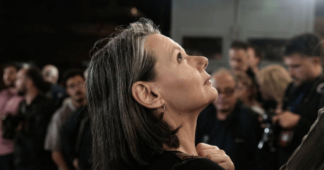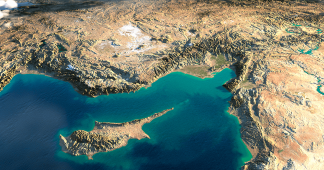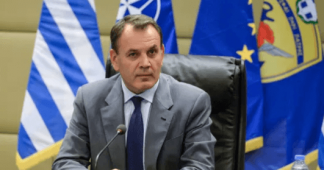By Dimitris Konstantakopoulos
“In our time the national coincides with the popular and the popular with the national”
Dimitris Glynos,
“What is the EAM and what it wants” (*)
It is obvious that SYRIZA is threatened with breakup and disintegration. Whether it will survive depends on several factors, but the most crucial of them (not the only one, of course) is the stance it will take in the upcoming Greek-Turkish (i.e. American-Turkish) negotiations.
Will it stand by the Greek people who want, in their vast majority, to defend what is left of their state, their legal and legitimate national interests, and even what remains functional in their democracy (which is the opposite of xenocracy, it is the power of the Dimos – People, not of Xenoi – Foreigners)? Will it actively oppose a policy that will either cause a new and more serious crisis in relations with Turkey, or lead to concessions that will make the Greek (and Cypriot) state unsustainable? A policy that may also lead to a major national crisis. (2)
The situation that is taking shape is a historic and probably the last chance for SYRIZA to prove that it was not just a firework.
Could it be, on the contrary, that it will take side, with various excuses and evasions, by acts or omissions, openly or through the display of tolerance and with evasive promises, with the interests of America and the “collective West”, which are in direct conflict with the interests of the Greek people and seek not so much the mutilation of Greece and Cyprus, but rather their complete abolition as independent, democratic, sovereign and, ultimately, Greek state?
This is their pursuit, because they need at all costs (at the cost of Greece and Cyprus among others) to fully “recruit” Turkey into the war against Russia and they are prepared to give it whatever it asks for. As one can see, Ankara is not a given, it is not predictable as our politicians are, moreover taking pride on that.
(Whether Erdogan will stand firm in his new courtship or collect the concessions and turns them around afterwards is anybody’s guess.)
But also because they, the “deep western establishment”, want to grab the “geopolitical surplus value” of the wider Greek space, just as they grabbed our economy and our politics; they want to complete the seizure of the Greek nation-state, to leave here a country of a dying and shrinking population, a major military base for their campaigns in the East, which will be called the “Hellenic (Greek) Republic”, but will have nothing Hellenic (Greek) and nothing democratic and will be heading towards “a Greece without Greeks”, as Mikis Theodorakis, with his amazing intuition, prophesied at the beginning of the application of the “bail-out” programmes and their memoranda.
In today’s global and in the particular Greek conditions of a people and a state threatened not only by Turkey, but by the entire “political-economic” collective West, the defense of the nation-state, the greatest conquest of the French Revolution and embodiment of the right of peoples to self-determination as proclaimed by the Russian Revolution, is the most basic progressive task of every man and every politician who wants to be called left-wing and progressive.
We may in the future have democratic federations and confederations that end the prehistory of humanity and pave the way to a higher civilization.
For the time being, and for such a prospect to remain open, we must defend – while working to make it much better, certainly – the only institution that ensures that we have public schools, hospitals and pensions and social security. Not that we have a lot of that in the actual state of Greece; imagine though even this did not exist.
The Greek left does not act in the context of an imperialist nation, where it should certainly act frontally against imperialism. It acts in the context of a nation fundamentally threatened from all sides.
If SYRIZA (and PASOK) stand resolutely on the side of the Greek people and not the Americans, they will do a great service to their country and especially to the popular strata; to those in need of their state and their nation, in need of protection; those who do not have houses in London and deposits in Geneva. They will also retain a place on the future political map of Greece. They will at least wash away some of the shame of 2015 (of 2010 for PASOK). (3)
If they don’t, they will not only disappear from Greek political life, they will have opened up very bad roads for what remains of the country.
If the Cypriot tragedy (4) paved the way for the fall of the dictatorial regime, the Greek tragedy that is being prepared, if we do not stop it, will set the basis for further (because the task has already been largely accomplished “by stealth”) overthrowing of the democratic regime associated with the post-dictatorial era and the rise of PASOK. Abject forces, which the left says it opposes and despises, will eventually take over the management of what remains of the Greek space.
The moment of truth has come for the Greek left in all its versions (as it has also come for PASOK and for everyone else in the country).
Notes:
- Dimitrios Glynos (https://en.wikipedia.org/wiki/Dimitris_Glinos) was the writer of the Manifesto of the EAM, the Greek National Liberation Front, which has been the main organization of the Greek resistance during WWII and by far the biggest in all Europe in relative terms (compared to the magnitude of the country and of its population). At the end of the “triple occupation” of Greece (German, Italian, Bulgarian) it had an army of 100.000 people (counting its reserve army). Two thirds of the whole Greek territory were liberated by the resistance before the retreat of the German Nazi troops and they were ruled by new democratic popular institutions.
- The writer refers to the policy designed by the US administration and followed obediently by the Mitsotakis government. It provides essentially for huge sovereignty concessions in the Aegean islands, in order to “calm down” Ankara and create a “common” NATO front in South-Eastern Mediterranean. Of course US are not interested in giving to Turkey the control of the Aegean, which is the strategic prolongation of the Straits. They are using Turkish extreme nationalism in order to take from the Greeks the control of the Aegean, not to give it to the Turks.
- In May 2010 the Pasok government headed by George Papandreou and elected upon a programme of social redistribution has signed the infamous bail-out programs imposed by the EU, the ECB and the IMF. Those programs – much worse that what is usually imposed to third world countries – were contrary to the pre-election promises of the Government, to the Greek law and constitution, to the Treaties of the European Union itself and, even, to the statuses of the IMF. They provoked the biggest drop of GDP in a western country after WWII (27% that is comparable to the Big Depression of 1929 in the US). As a result of these programs the social welfare system of Greece has all but collapsed, the debt itself jumped from 110% of the GDP to 185% and the country is facing a demographic disaster! In January 2015, Greeks have elected a government of SYRIZA and Independent Greeks (An.Ell.) on the promise of repudiating those programs. In July they voted in a referendum against the continuation of those policies. One week after the referendum the Tsipras – Kammenos government decided not to respect its result.
- In July 1974 the CIA – imposed Greek junta organized a coup in Cyprus – a nearly exact replica of the September 1973 coup in Chile – in order to kill the Cypriot President Archbishop Makarios, destroy his state and provide NATO ally Turkey with the pretext to invade Cyprus, in the context of an American (if not American – Israeli) plan directed by Henry Kissinger, aiming at destroying the Cypriot state. The Greek army, controlled at all levels by the CIA did not provide any reaction to the Turkish invasion. As a result the Greek dictatorship collapsed, a power vacuum was created in the country and Konstantinos Karamanlis was expedited immediately to Greece by the US and France, to “restore democracy”, in reality to avoid a more radical turn of events, like in Portugal also in 1974.











